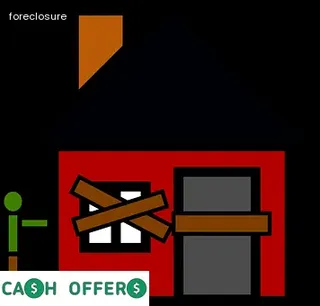Foreclosures are a stressful reality for many Arkansas homeowners. However, understanding the legal process of foreclosure in the state can help people navigate their individual situation and make an informed decision about their future.
In Arkansas, foreclosures are typically judicial foreclosures, meaning that the lender must file a lawsuit in court to take back the property. This process begins by serving the homeowner with a complaint that sets out the reasons why they are being sued and gives them a certain amount of time to respond.
Once this period has passed, if no response is given, a default judgment is entered against the homeowner and their right to stay on their property ends. If a response is filed, then a trial will be held to determine whether or not foreclosure will occur.
After either an uncontested or contested judgment from the court, an Order of Sale is issued which states when and where the sale of the property will take place. At this auction, any qualified bidder may purchase the house; however, if no bids are received, it will revert to ownership by the lender at which point they may choose to rent it out or pursue other options.
Knowing your rights as an Arkansas homeowner regarding foreclosure can help you make more informed decisions throughout this difficult process.

The preforeclosure process in Arkansas is a period of time that allows homeowners to try and reclaim their home before it goes up for sale. During this period, the homeowner has certain rights and responsibilities they must follow.
Homeowners should familiarize themselves with the foreclosure laws and procedures in their state, as these vary from state to state. It’s important to understand that if a homeowner fails to make payments or otherwise comply with the terms of their loan, they may face legal action from their lender.
Homeowners should seek legal advice if they are facing foreclosure, as this may help them determine what options are available to them. Preforeclosure can also be a good opportunity for homeowners to negotiate with their lender for more favorable repayment plans or loan modifications.
During preforeclosure, homeowners have the right to contact the lender directly or work through a third-party negotiator on their behalf. Homeowners can also attend foreclosure auctions, although they should be aware that purchasing the property at auction will require immediate payment in full.
Navigating Arkansas foreclosure laws and processes can be daunting for homeowners. It is important to understand the different steps of the process to ensure that rights are protected throughout.
The first step in the Arkansas foreclosure process is a Notice of Default, which informs the homeowner of their delinquency on mortgage payments and gives them time to catch up on missed payments or negotiate with the lender. After this, a Notice of Sale will be issued, which allows for a public sale of the mortgaged property.
Homeowners should be aware that during this period they still have certain rights such as redemption or reinstatement; these options provide an opportunity to settle debts and keep one's home from being sold at auction. Following the sale, an Order of Foreclosure is issued if there are no objections raised by either party.
This document officially transfers ownership of the property from the homeowner to the buyer and completes the foreclosure process.

In Arkansas, homeowners facing foreclosure can be subject to a variety of methods. The most common are judicial foreclosure and non-judicial foreclosure.
Judicial foreclosures require that the lender file a lawsuit in court, allowing the homeowner an opportunity to defend against any claims made by the lender. If the homeowner is unable to repay the loan, a judge may ultimately order that the home be sold at an auction.
Non-judicial foreclosures involve lenders taking control of the property without going through court proceedings. This allows them to seize and sell the house more quickly than with a judicial foreclosure but does not give homeowners as much time to make arrangements or seek alternate solutions such as refinancing or modification of their loan terms.
Arkansas also has laws that allow for deed in lieu of foreclosure, where homeowners voluntarily transfer ownership of the property to their lender in exchange for debt forgiveness.
Navigating and understanding foreclosure laws and procedures in Arkansas can be tricky for homeowners. It is important to know how to avoid the possibility of foreclosure in the state, which can lead to serious financial consequences.
Understanding the laws and regulations surrounding foreclosure in Arkansas is key, as well as learning about the different options available for avoiding it. Homeowners should be aware of the types of mortgages offered in Arkansas, consider refinancing their mortgage, or working with a credit counselor or housing counselor to create a repayment plan.
Furthermore, homeowners should take advantage of potential foreclosure prevention programs offered by the state such as loan modification and mortgage assistance programs. Additionally, they should always reach out to their lender first if they are having trouble making payments so they can work together on solutions rather than waiting until it's too late.
Taking proactive steps towards avoiding foreclosure can help alleviate potential worries down the road.

When it comes to foreclosure proceedings in Arkansas, understanding the state’s deficiency judgment laws is essential. A deficiency judgment is a court order that requires a homeowner to pay their lender any remaining balance on their mortgage after their home has been sold through foreclosure.
Generally, when a lender initiates a foreclosure sale, they must abandon any claims to the unpaid debt if the proceeds from the sale are not enough to cover the amount owed. However, if permitted by law in that state, lenders may file for a deficiency judgment in order to recover some or all of their losses.
In Arkansas, a deficiency judgment may be filed up to two years after the completion of a foreclosure sale and will be enforced for five years after the date of issuance. It is important for homeowners facing foreclosure proceedings in Arkansas to understand that lenders have the option of suing them for any remaining balance even after their home has been sold at auction.
Knowing and understanding this law can help Arkansas homeowners protect themselves during these difficult times.
Failing to make mortgage payments in the state of Arkansas can have serious consequences for homeowners, potentially resulting in foreclosure. A homeowner who has missed a payment or multiple payments may receive a notice from their lender notifying them of an impending foreclosure action.
If no response is given to the notice and further payments are missed, the lender will begin proceedings to seize and sell the property in order to recover their losses. After a foreclosure sale is completed, any remaining debt will become the responsibility of the former homeowner, and they may also face other legal repercussions such as credit damage and difficulty obtaining future loans.
Homeowners should be aware that there is a timeline associated with foreclosures; if they do not take action on their mortgage situation within the prescribed period, they can expect swift action from their lender.

Falling behind on mortgage payments often leads to a homeowner facing foreclosure. Before this happens, it is important to know how Arkansas law defines breaching the mortgage contract and the associated consequences.
In Arkansas, a breach of mortgage contract occurs when payment has not been received within 10 days after it was due or if the homeowner fails to make payments for three months. When this breach occurs, the lender can take legal action against the homeowner.
This process typically begins with the lender sending a notice of default and acceleration letter informing them that they are in danger of losing their home due to nonpayment. The homeowner then has 30 days to cure their default by paying all past-due payments plus any late fees and costs associated with initiating foreclosure proceedings.
If these payments are not made within the allotted time frame, the lender will proceed with foreclosing on the home.
Initiating a foreclosure action in Arkansas is a complex process, beginning with the homeowner's lender sending a Notice of Default and Demand for Payment. This notice informs the homeowner that their mortgage payments are past due and gives them 30 days to catch up on their payments, or else their home may be foreclosed upon.
After the Notice of Default has been sent, if the loan remains unpaid, then the lender must file a Complaint for Foreclosure in an Arkansas Circuit Court. The Complaint for Foreclosure will document how much money is owed to the lender as well as any other related fees.
Upon filing this Complaint, the court will issue a Summons that must be served to the homeowner by mail or private process server. Once served, the homeowner will have 30 days to respond to the Summons with an Answer or Motion.
If no response is made in that time frame, then they are considered in default and the lender can move forward with foreclosure proceedings without further input from the homeowner.

Navigating foreclosure laws and procedures can be a daunting task, especially in the state of Arkansas. It is important for homeowners to understand the laws governing foreclosures in Arkansas as they may find themselves facing this situation at some point in their lives.
According to Arkansas law, lenders must issue a written demand for payment before beginning foreclosure proceedings. This demand must include the amount due, any additional interest and fees, and a statement that the loan is in default.
If the borrower fails to make payments on the loan within 30 days of receiving the notice, then lenders may begin foreclosure proceedings by filing a complaint with the court. The lender must also notify all interested parties of the foreclosure action by serving them with a copy of the complaint.
The court will review all evidence presented by both sides before making its decision regarding whether or not foreclosure will take place. If approved, an order of sale will be issued by the court allowing for public auction or private sale of property to satisfy debt.
It is important for homeowners to understand their rights and responsibilities when it comes to navigating Arkansas foreclosure laws and procedures so they are prepared if they ever find themselves facing such an unfortunate situation.
Homeowners in Arkansas have the right to reinstate their mortgage before the foreclosure sale takes place. This means that they can pay off the amount past due and bring the loan current.
However, if the homeowner does not pay in full before the foreclosure sale, then they must still pay all of the past due amounts plus any costs associated with the foreclosure proceedings to stop or delay a foreclosure sale. In order to reinstate their loan, homeowners should contact their lender and ask for a reinstatement quote.
It is important to understand that lenders may charge additional fees, so it is important to read all documents carefully before signing anything. Homeowners should also be aware that once foreclosure proceedings have begun there are certain deadlines that must be met in order to avoid a sale of the home.
Lastly, it is important for homeowners to remember that even if they are able to reinstate their loan, some lenders may still pursue foreclosure as an alternative option.

When it comes to foreclosure in Arkansas, there is no lengthy redemption period for homeowners after the foreclosure sale has been finalized. This means that once a home has been sold by the lender, the homeowner no longer has any legal rights to the property and must vacate immediately.
Arkansas law requires all foreclosure proceedings to be conducted through a court of law, which also determines whether or not a redemption period will be granted to the homeowner. Most lenders will only grant a redemption period if they can recoup more money from this than through the auction process.
If no redemption period is granted, then whatever assets are left in the home must be removed and all debts associated with it must be paid off in full by the homeowner prior to leaving. It is important for homeowners to understand these laws and procedures so they can prepare themselves should they ever find themselves in danger of losing their home due to foreclosure.
Navigating Arkansas foreclosure laws and procedures can be a daunting task, but the right legal assistance can make all the difference. Hiring an Arkansas foreclosure lawyer is a great way to ensure that your rights as a homeowner are upheld during this difficult process.
An experienced attorney can provide homeowners with the resources they need to understand their options, manage paperwork, and negotiate with lenders in order to receive the best possible outcome. In addition, an experienced foreclosure lawyer will be familiar with local laws and procedures that may impact how a case is handled and can explain any potential complications in detail so homeowners can make informed decisions throughout the process.
It’s important to thoroughly research any lawyer you consider hiring, making sure they have experience in foreclosure cases similar to yours. Ultimately, obtaining legal assistance from an AR foreclosure lawyer is essential for homeowners who want their rights protected and the best possible outcome for their situation.

When dealing with the possibility of foreclosure, homeowners in Arkansas should explore all options available to them before allowing their house to go into foreclosure. One alternative is a loan modification, which can be done if the homeowner has difficulty making payments on their loan.
This involves working out an agreement with the lender that lowers the monthly payment or makes other changes to the terms of the loan. Another option is a repayment plan, in which past-due amounts are added onto current payments and spread out over an extended period of time.
Homeowners may also decide to pursue a short sale, wherein the lender allows them to sell their house for less than what is owed on it and forgive any remaining balance. Finally, homeowners can consider bankruptcy protection as another alternative to foreclosure, though this should be done only after consulting with an attorney who specializes in bankruptcy law.
Navigating Arkansas foreclosure laws and procedures can be a difficult process for homeowners. Knowing what to expect and how to prepare ahead of time can help reduce the potential for loss during the foreclosure process.
Understanding the different phases of foreclosure enables homeowners to take advantage of potential options that may allow them to avoid or mitigate losses. For example, some situations may give homeowners the opportunity to modify their loan terms and work out a repayment plan with their lender.
Additionally, government-sponsored programs may provide additional resources that might be applicable in certain circumstances. Homeowners should also be aware of their rights as provided by AR state laws and should never hesitate to seek legal counsel if they feel overwhelmed or confused by any steps in the foreclosure process.
Lastly, it is important for homeowners to remember that even after the foreclosure is finalized, there are other resources available such as credit counseling services that can help rebuild credit score and begin saving for future housing opportunities.

Navigating Arkansas foreclosure laws and procedures can be a daunting task for any homeowner. There are two main types of foreclosure proceedings in Arkansas: judicial and non-judicial.
Judicial foreclosures involve the filing of a lawsuit in court, while non-judicial foreclosures are conducted outside of the court system and do not require a lawsuit to be filed. The outcome of a foreclosure will depend largely on which type is used.
With a judicial foreclosure, the homeowner is given an opportunity to contest the foreclosure and may have the ability to negotiate with their lender for an alternative solution such as loan modification or deed in lieu of foreclosure. If these negotiations are unsuccessful, the court ultimately decides whether or not to grant the lender’s request to foreclose on your home.
Non-judicial foreclosures generally do not involve negotiations between the borrower and lender; instead, lenders can sell your home at auction if you default on your mortgage payments. Ultimately, it is important for homeowners to understand both types of Arkansas foreclosures so that they can make informed decisions about how to best address their situation.
Foreclosure is a complex process, and the timeline for completion can vary greatly depending on the specifics of each case. In Arkansas, the foreclosure process typically begins with a Notice of Default issued by the lender.
This notice informs homeowners that they are in default on their mortgage payments and must take action within 30 days. Once this period has elapsed, the lender may proceed to file a Complaint of Foreclosure with the court.
The Complaint will be served to all parties involved in the foreclosure process and will include information about the amount owed and other relevant details. After the Complaint is filed, homeowners will have 30 days to respond before a foreclosure judgment is entered.
If no response is received, then a foreclosure sale may happen as soon as 60 days after filing of the Complaint. However, if there are disputes over payment or other matters, additional hearings may be required which can lead to delays in proceedings.
Further delays may occur if a homeowner chooses to pursue bankruptcy or other legal options which can result in an extended timeline for completion of the foreclosure process in Arkansas.

Many people let their home go into foreclosure because they are unable to keep up with the burden of mortgage payments. As economic conditions change, people may find themselves in a financial situation where they can no longer afford their mortgage.
Other factors, such as job loss, medical bills, divorce, or other financial hardships can also lead to foreclosure. In recent years, the housing market has been particularly volatile and many homeowners have found that their homes are worth less than what they owe on them – leaving them with no choice but to let their house go into foreclosure.
It is important for homeowners in Arkansas to familiarize themselves with the applicable state laws and procedures so that they can navigate the process and make informed decisions about their future.
Foreclosure is a process used by lenders to recover the balance due on a loan when a homeowner defaults on their mortgage payments. In Arkansas, the process is regulated by state laws, which dictate how and when foreclosure may occur.
Generally, the lender must first provide written notice to the borrower that they are in default of their loan agreement and explain that foreclosure may be imminent if payment is not made. If the loan remains unpaid for a period of 30 days or more, then the lender can file a complaint with the circuit court in order to start foreclosure proceedings.
Once this occurs, the homeowner must respond within 20 days; otherwise, they run the risk of losing their home without further opportunity for legal recourse. The court will then review all relevant documents before deciding whether to grant a judgment of foreclosure against the property owner.
If granted, this judgment allows the lender to sell or take possession of the home as repayment for any outstanding debt owed. Knowing your rights under Arkansas law is essential throughout this entire process, so it's important to seek legal counsel if you find yourself facing foreclosure.
If you are a homeowner in Arkansas facing foreclosure, there are steps you can take to stop the process. The state of Arkansas has specific laws and procedures in place that must be followed to halt a foreclosure.
You should start by contacting your lender or mortgage servicer as soon as possible to discuss your options. Your servicer may be able to provide loan modifications or other alternatives such as repayment plans, forbearance agreements, and deed-in-lieu of foreclosure arrangements.
Additionally, Arkansas offers several programs designed to help homeowners facing foreclosure such as the Homeowner’s HOPE Hotline, the Homeowner’s Assistance Program (HAP), and the Foreclosure Prevention Program (FPP). These resources can provide guidance and support in navigating the complexities of state foreclosure laws.
Finally, it is important to consult with an experienced attorney who is knowledgeable about Arkansas foreclosure law for legal advice about how to best protect your rights under the law.